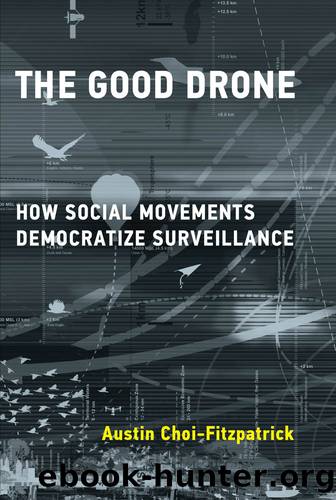The Good Drone by Austin Choi-Fitzpatrick

Author:Austin Choi-Fitzpatrick
Language: eng
Format: epub
Publisher: MIT Press
DRONES FOR SOCIAL MOVEMENTS AND HUMAN RIGHTS
The camera’s shift from tripod to hand to sky is significant for civil society actors. Small UAVs are able to provide a more constant stream of images than are available from satellites, and at much lower cost. Likewise, helicopters are able to do many of the things small drones can, but require financial capital for the craft and political capital for official access to airspace. Human rights advocates and social movements are very rarely in possession of these resources, making lightweight and easy-to-pilot quadcopters an accessible and affordable alternative. It goes without saying that putting a camera in the air makes new spaces visible. Walls and roofs and trees are no longer what they used to be. One need only think about the extensive efforts to harden American embassies after the attacks of September 11, 2001. A terrestrial glance at any embassy reveals a phalanx of physical obstacles, hardened guardhouses, and shatterproof glass. A view from the air suggests little thought was given to devices that could find their way into every nook and cranny, no matter the height or angle. The same can be said for skyscrapers, prison compounds, factory farms, prison camps, mass graves, plundered wealth, and any other secreted location relied on by the powerful.
An early implication is that the age of democratic surveillance is upon us. By democratic, I hope to signal the shift from the high-cost and top-secret tools used by the powerful to a more accessible set of resources used by everyone else. Camera-equipped drones do for the atoms of open air what hackers have done for the bits and bytes of the Internet.
Drones allows us to hack the world of atoms.
New devices allow us to gather new data and tell new stories, while also raising tricky questions about transparency and accountability. Who will hold a drone-equipped advocacy group accountable for footage of at-risk migrants? Will the rules be the same as those that currently apply to photojournalists or camera-equipped activists? Perhaps a new set of criteria will emerge. Will self-surveillance emerge as a pre-emptive tactic for actors challenging states and other powerful authorities? It seems reasonable to suggest that if police officers should be equipped with body cameras to look out at the world, they should also be tethered to drones that observe the officer in situ. If this seems like a radical proposal, we can then ask who is more likely to implement it—independent monitors like the American Civil Liberties Union, or police departments themselves, as a preventive measure? Critics may rightly observe that if police kill with impunity despite the ubiquity of mobile phones, then always-on drone surveillance might not matter. Indeed, the nature of the sociotechnical is such that technologies fit within larger sociopolitical realities. If stable repertoires of use are nowhere on the horizon, then laws and norms are even further off. If the powerful can commission satellite surveillance, as George Clooney has recently done over Darfur, then should The People be prevented
Download
This site does not store any files on its server. We only index and link to content provided by other sites. Please contact the content providers to delete copyright contents if any and email us, we'll remove relevant links or contents immediately.
Whiskies Galore by Ian Buxton(40513)
Introduction to Aircraft Design (Cambridge Aerospace Series) by John P. Fielding(32348)
Small Unmanned Fixed-wing Aircraft Design by Andrew J. Keane Andras Sobester James P. Scanlan & András Sóbester & James P. Scanlan(32148)
Craft Beer for the Homebrewer by Michael Agnew(17463)
Turbulence by E. J. Noyes(7059)
The Complete Stick Figure Physics Tutorials by Allen Sarah(6649)
Kaplan MCAT General Chemistry Review by Kaplan(6066)
The Thirst by Nesbo Jo(5795)
Bad Blood by John Carreyrou(5782)
Learning SQL by Alan Beaulieu(5427)
Weapons of Math Destruction by Cathy O'Neil(5048)
Man-made Catastrophes and Risk Information Concealment by Dmitry Chernov & Didier Sornette(4749)
iGen by Jean M. Twenge(4708)
Digital Minimalism by Cal Newport;(4569)
Life 3.0: Being Human in the Age of Artificial Intelligence by Tegmark Max(4521)
Audition by Ryu Murakami(4107)
1,001 ASVAB Practice Questions For Dummies by Powers Rod(4046)
Electronic Devices & Circuits by Jacob Millman & Christos C. Halkias(4044)
Pale Blue Dot by Carl Sagan(4017)
